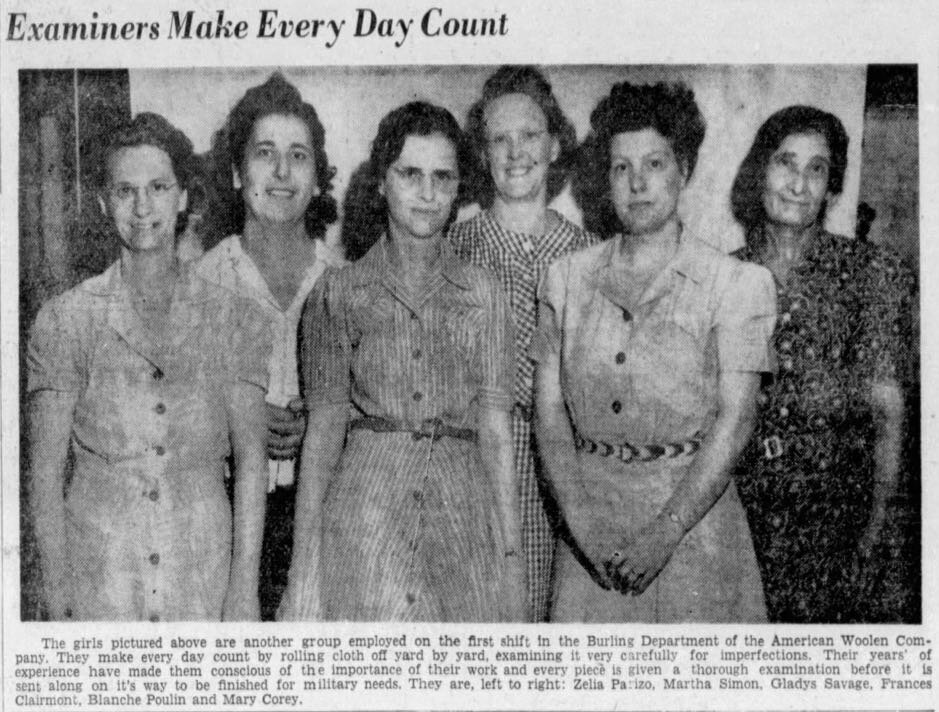Interview with Monica Farrington
/by Paige Burton
Martha’s burling tweezers
Over the past few weeks, I’ve had the pleasure of speaking with Monica Farrington about her family connections with the Winooski mills. Monica was born and raised in the Winooski-Burlington area by her mother Martha Simon (nee Allen), who spent around 25 years working in the American Woolen Mill in Winooski. Martha was a burler. She scanned through fabric for knots and imperfections and pulled them out with tweezers. Monica still has a few pairs of her mother’s burling tweezers and shared photos of them with me.
Monica originally became interested in her family’s mill history while working nights as a camera operator at Channel 3 and meeting people who were researching labor history. She started looking into articles about labor in the area, leading to finding a newspaper article including a photo of her mother alongside a group of burlers in the Burlington Free Press. The photo features Martha and several other women working in the mills, and was part of several stories printed in the newspaper about the mills at the time. Her mother, some of her aunts and her friends’ parents were all working in the mills at some point.
Above: Martha (second from left) and several other burlers featured in the Burlington Free Press, August 17, 1943
Monica tells me her mother was born in Barre on January 5th, 1915, to parents who had emigrated from Lebanon in the late 1890s. She described her mother as “straddling” between Lebanon and Vermont, and only remembers her speaking English. Monica learned Lebanese from her grandmother, who would babysit her while Martha was at the mills.
Portrait of Martha, age 22
The Allens moved between Barre, Montpelier, and Burlington, eventually opening up a store on Howard St. Monica recalls that when Martha was 15, “My grandfather got her a summer job, … they put her in the mill working. She was supposed to leave that fall and go back to school. She would’ve been a junior, and my grandfather wouldn’t let her leave, he was making her work and give him the paycheck.” She had been a good student, and a priest from her school had even come to the house to try and convince Martha’s father to let her quit her mill job, to no avail. She worked in the mills for around 25 years.
Monica remembers her mother “would take the bus to Winooski” every day at around 7 am, and she worked until around 4 pm, making between five and seven dollars a week. In the summer the mills would get extremely hot, and Monica recalls her mother telling her that the workers would be given salt pills as they walked in to fight dehydration, saying it would help them “weather the heat.”
Although working at the mill was hard, and the machines were so loud that they couldn’t talk, Monica thinks her mother liked her work. Especially during the war, she told me that “spirits were high. I mean, they took pride in this work, and then during the war they all thought that they were contributing,” by making the wool that became uniforms and blankets for soldiers, who they would call “the boys.”
After 25 years, Martha left the mills and began work at a sewing factory in downtown Burlington on College Street. After the sewing factory she became a tailor at Sears, something she loved to do. Although Martha passed away in 1980, her memory lives on through Monica and the passion she has for this history.
Monica holding family recipe.
Monica shared her mother’s traditional Lebanese recipe for a dish called Kibbeh. Find the recipe in our blog article “ Lebanese Kibbeh Recipe”.
The Mill Museum would like to thank Monica for sharing her family story. Do you have a mill story to share? We’d love to hear it! Call us or send us a note at: #802-355-9937 or email info@themillmuseum.org
Paige Burton was our museum intern for the spring of 2021. In May, she graduated from UVM with a degree in History and Environmental Studies. Recently she moved to North Conway, NH and is working as the manager of the Summit Museum at the Mount Washington Observatory.






